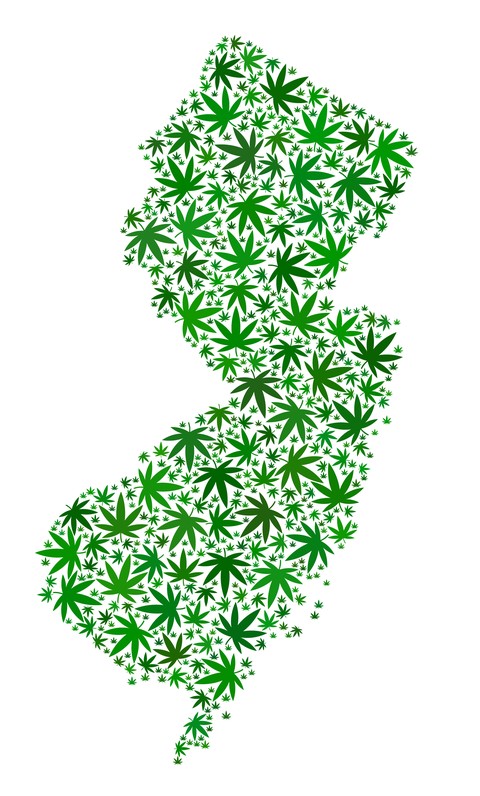On February 22, 2021, New Jersey became the 14th state to legalize the recreational use of marijuana when Governor Phil Murphy signed a group of laws that enacted the marijuana legalization ballot measure approved by more than two-thirds of New Jersey voters in November.
 Despite the overwhelming support for legalization by voters, thousands of people in New Jersey continued to be arrested for possession of marijuana over the past few months while the details of the new laws were being debated in Trenton. The new laws, as well as an Attorney General Directive issued shortly after the laws were signed, put an immediate end to new charges for possession of small amounts of marijuana by adults, and will result in the dismissal of thousands of cases currently pending in New Jersey courts.
Despite the overwhelming support for legalization by voters, thousands of people in New Jersey continued to be arrested for possession of marijuana over the past few months while the details of the new laws were being debated in Trenton. The new laws, as well as an Attorney General Directive issued shortly after the laws were signed, put an immediate end to new charges for possession of small amounts of marijuana by adults, and will result in the dismissal of thousands of cases currently pending in New Jersey courts.
Though the signing of the bills ends a major chapter in a three-year political saga surrounding marijuana legalization, the laws controlling the possession and sale of marijuana remain complex and some significant legal uncertainty remains, especially with regard to the regulations that will govern the regulated sale of marijuana. Prosecutors and defense attorneys will likely spend years arguing over inconsistencies and vague language in the hundreds of pages of new and amended laws. Though it is now clear that the sale and growing of marijuana will only be legal for registered businesses capable of compliance with a complex regulatory environment, even marijuana users should read the law carefully or consult with a lawyer about what is permitted and what remains forbidden.
This article highlights only some of the important changes brought about by the new laws, which are collectively hundreds of pages in length and contain too many details to distill into a brief article. Accordingly, this article is not intended as legal advice or a comprehensive legal review.
- The Heart of the Legislation: Decriminalization of Possession in Small Amounts
The political will surrounding decriminalization arose from a very disturbing truth: While there has never been an appreciable difference in the rate of marijuana use between minorities and white New Jersey residents, minorities have been nearly three times more likely to be arrested for marijuana possession. Thus, black residents have borne a disproportionate burden of the very real criminal consequences that follow a marijuana conviction.The most direct and simple fix to this problem was to legalize the possession and use of small amounts of marijuana, now that society has become more accepting and less concerned about the negative effects of the drug. Under the new legislation, the possession of less than 6 ounces of marijuana by an adult is now completely decriminalized and has no associated criminal or civil penalties. Pending cases based on possession of less than 6 ounces of marijuana will be dismissed. Possession of more than 6 ounces, however, is punishable as a fourth degree crime. Possession of larger amounts of marijuana carry even greater criminal penalties.Because marijuana is legal, a positive marijuana test cannot serve as the justification for a violation of probation, parole, or pretrial release. - The Black-Market Sale of Marijuana Remains Illegal, Even in Small Amounts
A legal market for sale of marijuana has not yet been established, but under the new legislation, unregulated or “black-market” sale of marijuana will remain illegal, and will remain a very serious criminal offense for those who illegally transact in large quantities. Possession with intent to distribute over 25 pounds of marijuana remains a first-degree offense punishable by over 10 years in New Jersey State Prison, and intent to distribute between 5 and 25 pounds remains a second-degree offense. Distribution of more than one ounce remains a third-degree offense.Penalties for the sale of smaller amounts have been reduced, however. Under the new laws, distribution of less than one ounce of marijuana is still illegal, but, for a first offense, the penalty is a mere written warning. Subsequent offenses for small amounts would be punished as a fourth-degree criminal offense, as they are currently. Supplying cannabis items to an underage person at any amount carries a civil penalty of $250 for a first violation and $500 for a second violation. A third violation is a disorderly persons offense, which carries potential imprisonment. - The Controversy: Dramatic Restrictions on Police Searches
As any criminal defense attorney or prosecutor will tell you, the smell of marijuana is one of the most often cited justifications for unplanned invasive searches of people and automobiles by police. “Plain smell” searches, which have long been deemed a legal exercise of police authority by the New Jersey Supreme Court, lead to temporary deprivations of liberty for thousands of additional people – disproportionately people of color – who may never be charged with a crime if no drugs are found. The Legislature made very clear that because possession of marijuana is now legal, the odor of marijuana may not be used as a justification to conduct a search of a person by the police (even if the possessor is underage).But the Legislature went further than to simply declare that the “plain smell” is no longer a legal justification for a search. The Legislature declared that it is a third-degree crime for police officers to conduct certain searches based solely on suspicion of marijuana. This aspect of the new laws drew immediate condemnation from the State Police Benevolent Association (PBA), which issued a statement the same day as the legislation calling the bill “intentionally designed to make law enforcement officers criminals overnight in New Jersey.” - Possession of Marijuana by Persons Under Twenty-One
The new laws create a framework for regulation of underage possession of marijuana by persons under twenty-one years old, but impose little in the way of punishment for violators. A first violation is met with a written warning. A second violation is met with a written warning, the provision of informational materials, and, for possessors under 18 years of age, parental notification. A third or subsequent violation triggers another write-up and a referral to a community services organization for counseling-type programs, but there is no obligation to take part in services. A child’s third violation, like a second violation, would also trigger parental notification.
Stahl Gasiorowski Criminal Defense is here for all of your criminal legal needs during this time. To contact the firm’s NJ office, call 908.301.9001 and to contact the firm’s NYC office, call 212.755.3300, or email Mr. Stahl at rstahl@stahlesq.com.



Leave A Comment